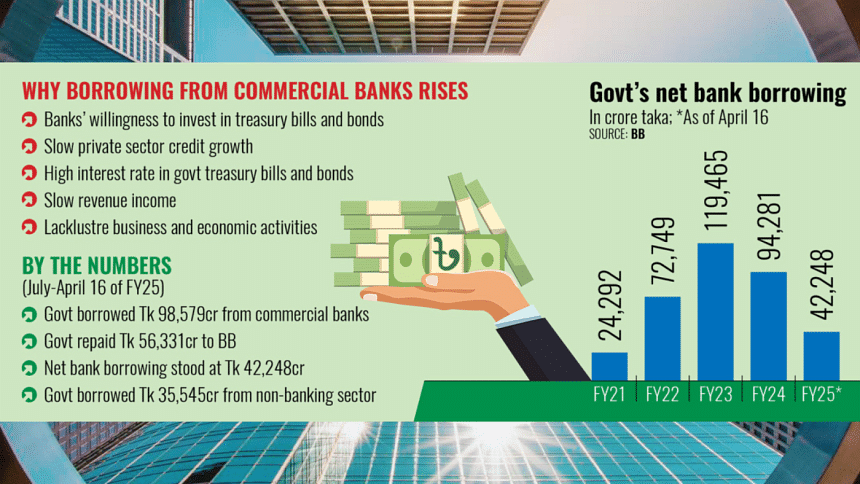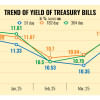Commercial banks’ lending to govt jumps 60%

The government's reliance on commercial banks for funds has surged in recent months, thanks to sluggish revenue growth and a slowdown in private sector credit demand.
With the central bank halting direct financing by printing new notes, the government also has no option but to turn to commercial banks to meet its fiscal needs.
By mid-April of fiscal year (FY) 2024–25, government borrowing from commercial banks had soared to Tk 98,579.21 crore, marking nearly a 60 percent rise from Tk 61,616 crore during the same period the previous year, according to Bangladesh Bank data.
Despite the sharp increase, net borrowing from the banking system stood at Tk 42,248 crore -- slightly lower than the Tk 46,355 crore recorded a year earlier.
Net bank borrowing is calculated based on the amount that the government has taken from banks, subtracted by that repaid to the Bangladesh Bank.
During July to April 16 of this fiscal year, the government repaid Tk 56,331 crore to the central bank.
The government usually borrows through treasury bills and bonds. Until last fiscal year, it also drew funds directly from the Bangladesh Bank.
However, this practice was suspended after widespread criticism from economists and policymakers, who warned that printing money amid a stubbornly high inflation would only push prices higher.
Speaking on condition of anonymity, a senior central bank official told The Daily Star that the government was left with little choice but to lean heavily on commercial banks after the central bank withdrew from direct lending.
"With tax revenue falling short of expectations, the government appears increasingly dependent on the banking sector to cover its budget deficit," he said.
Internal figures from the National Board of Revenue (NBR) show that revenue collection grew by just 2.76 percent during the first nine months of FY25.
Up to March, the NBR -- which accounts for 86 percent of the state's total revenue -- collected Tk 256,486 crore, falling well short of the revised target of Tk 463,500 crore.
Meanwhile, private sector appetite for credit has dwindled, discouraged by high interest rates and political uncertainty.
This has left banks with surplus liquidity, prompting them to invest more in government securities, according to industry insiders.
Credit demand in the private sector has apparently come to a halt, hitting its lowest level since at least 2004, indicating a distressed business and investment situation.
Private sector credit growth stood at 6.82 percent in February this year, down from 7.15 percent the month prior, as per Bangladesh Bank data.
Syed Mahbubur Rahman, managing director and CEO of Mutual Trust Bank, said, "Banks now are heavily invested in the government treasury bills and bonds as credit demand in the private sector comes down."
Mustafizur Rahman, distinguished fellow at local think tank Centre for Policy Dialogue (CPD), told The Daily Star that the government's need for borrowing is set to rise this quarter, which explains the growing reliance on bank loans.
However, he commented that the government still has room to borrow from the banking sector.
"The rate is still not alarming," Rahman added.
The revised budget for FY25 sets the government's net bank borrowing target at Tk 99,000 crore. So far, it has borrowed around 43 percent of that amount.
In addition to bank borrowing, the government has also raised Tk 35,545 crore from non-bank sources. These include non-bank financial institutions (NBFIs), insurance companies and individual investors, with funds raised through treasury bills and bonds.
From July last year to April 16 this year, the government borrowed a total of Tk 77,793 crore from domestic sources, excluding the net position in national savings certificates.

 For all latest news, follow The Daily Star's Google News channel.
For all latest news, follow The Daily Star's Google News channel. 








Comments